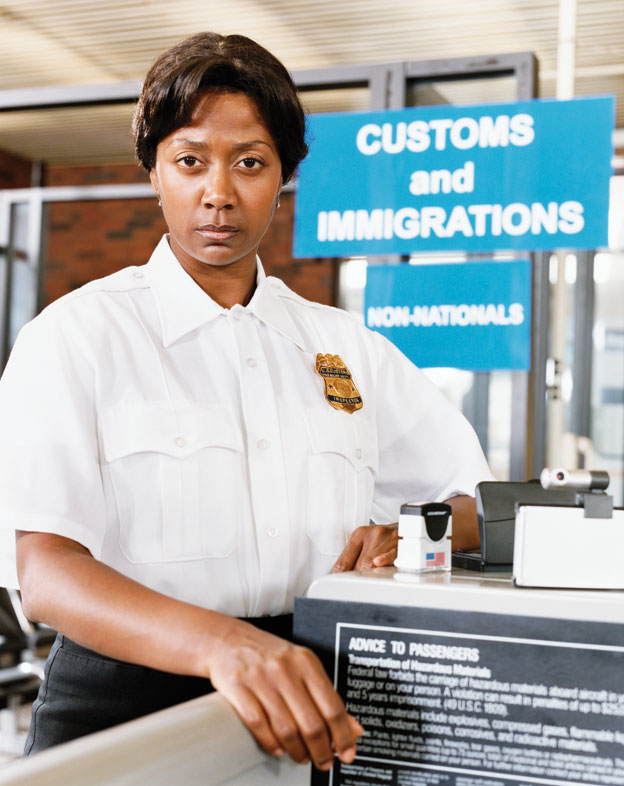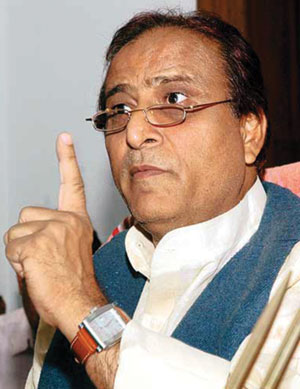SOCIETY:
Touch Me Not: The Indian 'VVIP' Syndrome
India’s political class consider themselves to be a breed apart. Whether at home or in another country, they consider it their right to be treated as if they are royalty, not a common person like you and me who actually elected them to hold this public office. They need to step up when it comes to performing their duties respectfully, and behold the civic sense voters expect from them, writes Siddharth Srivastava.

We have yet another instance of a VVIP, this time Uttar Pradesh minister Azam Khan, being questioned by security officials at an American airport. Apparently, Khan was gently quizzed by a lady officer for ten minutes, the time normally taken by disembarking passengers to visit the restrooms, if there is a bit of rush.
Usually, when they take you aside in the U.S., they could also do so for a strip search. But Khan suffered no such indignity, though he should be happy he now belongs to a long list of more distinguished Indians who have been double-checked at American airports many times. They include Aamir Khan, Hrithik Roshan, Shahrukh Khan, and Abdul Kalam, among others. Most have carried on with their itineraries, except SRK, who once timed his very public airing of grievance to the release of a movie, which was a good marketing strategy.
 (Right): Azam Khan (Right): Azam Khan
Azam Khan could have easily headed to Harvard along with Akhilesh Yadav, the Chief Minister of Uttar Pradesh, India’s most populous state, whose hands are full managing egocentric uncles, relatives and father Mulayam Singh’s rabblerousing pals like Khan.
Harvard University invited Akhilesh and Khan, to speak on the handling of Kumbh Mela, a logistical nightmare involving millions of God-fearing devotees who believe that a dip in the heavily polluted Ganga and Yamuna will cleanse them of sins for eternity, even if they have to deal with sores and skin disease in the immediate future.
The students of Harvard instead got to witness a firsthand case study of a pure breed, narrow-minded, vote bank-seeking, middle level Indian politician, at his rabid best. This should be helpful to anybody wanting do business with India. They need to know how to deal with lawmakers like Khan. They abound.
Indian politicians as we know, and by now probably folks at Harvard have also discovered, thrive on any opportunity for free political mileage. Khan sensed a global audience from Boston, an occasion to be on CNN, BBC and Times Now, all at the same time.
He went ballistic linking the security episode to America’s imperialistic designs, specific anti-Muslim profiling at airports, a weak Manmohan Singh as Prime Minister due to which he was targeted. Khan’s equally demented supporters joined the chorus deriding the U.S. authorities and Prime Minister Singh.
The Prime Minister, for once, reacted rightly by keeping silent. President Obama, already caught up handling deranged kids in America, probably thought Khan was a supporter of former Pakistani President Pervez Musharraf seeking asylum. Narendra Modi probably thought it was a stupid idea to fly all the way to America when a 3-D video conferencing could have worked better. Rahul Gandhi probably feels Khan should undertake a train journey to learn about the real America.
Though there is some truth about people with Muslim names being targeted at U.S. airports since the 9/11 attacks, Khan clearly went overboard in trying to kill ten political birds with one stone, including canceling the Harvard lecture. Ideally, he should have lodged a formal complaint, used the restroom and carried on with his program.
Instead, students of Harvard, luckily (or unluckily), also got a glimpse of India’s overbearing VVIP culture that is very touchy about having their way, including walking in and out of Indian airports and aircrafts unchecked and unhindered as if they are visiting a restaurant in a mall or a movie hall.
Common Indian citizens, of course, have to submit themselves to a physical rub down at these locations by semi-literate, ill-trained, lowly paid security guards derived from impoverished areas such as Bihar, who spend most of their day scratching private parts, smoking and chewing tobacco. It is not hygienic!
The Indian VVIP culture reflects an attitude of superiority, invincibility and treating common citizens like dirt. It thrives on trampling the rule of law, abuse of power and treating of taxpayers’ money as a personal savings account with free unlimited withdrawals. The VVIP could be ministers, bureaucrats, officials, or goons protected by the state due to connections or money.
One manifestation of high-handedness is witnessed on Indian roads everyday where a commuting VVIP is accompanied by an entourage of SUVs stuffed with heavily armed security personnel who menacingly weave their way through heavy traffic at high speeds. They jump red lights, don’t line up at tollbooths and expect everybody else to quickly move aside or else abuse and assault with impunity. Only in India, ambulances get caught in traffic, but never a VVIP convoy, and Domino’s Pizza home delivery.
|